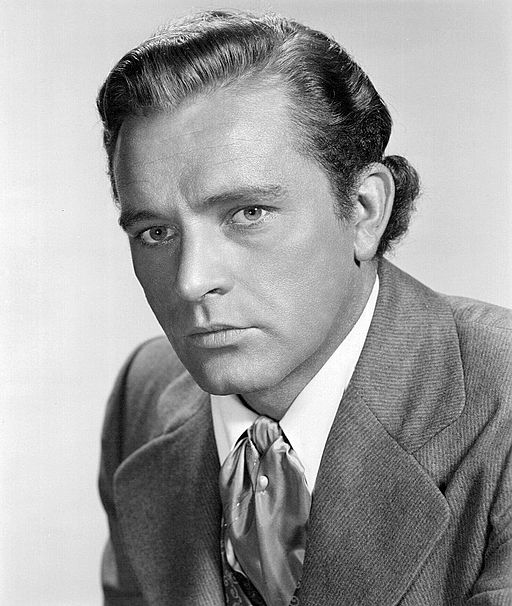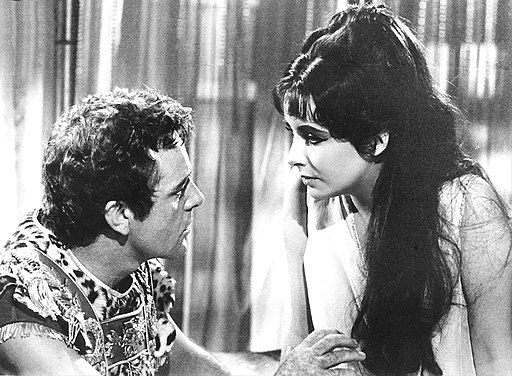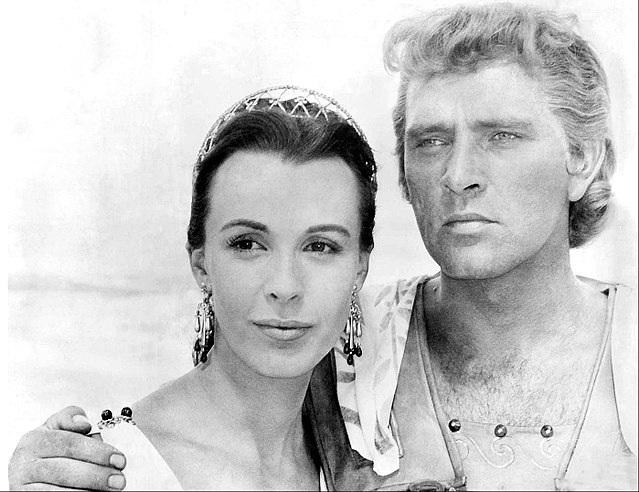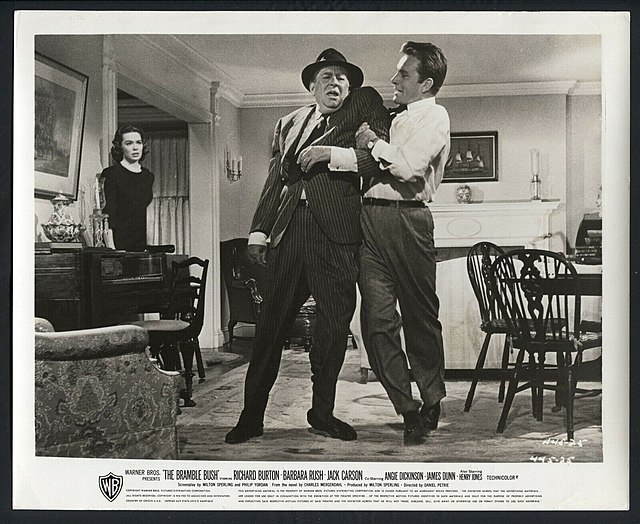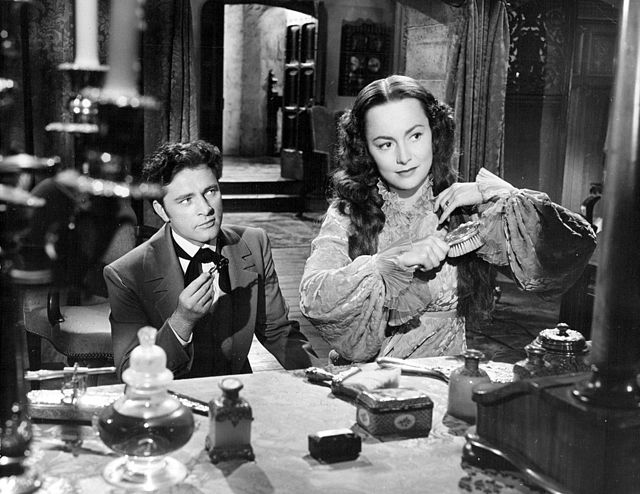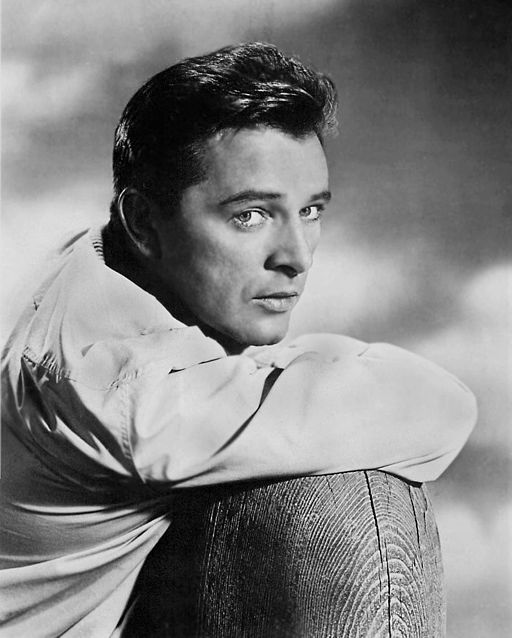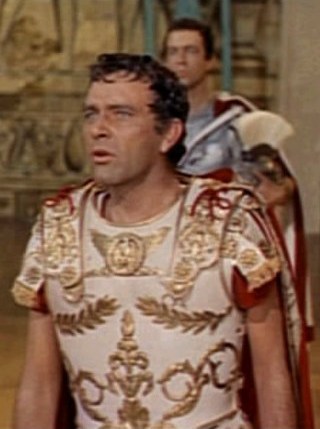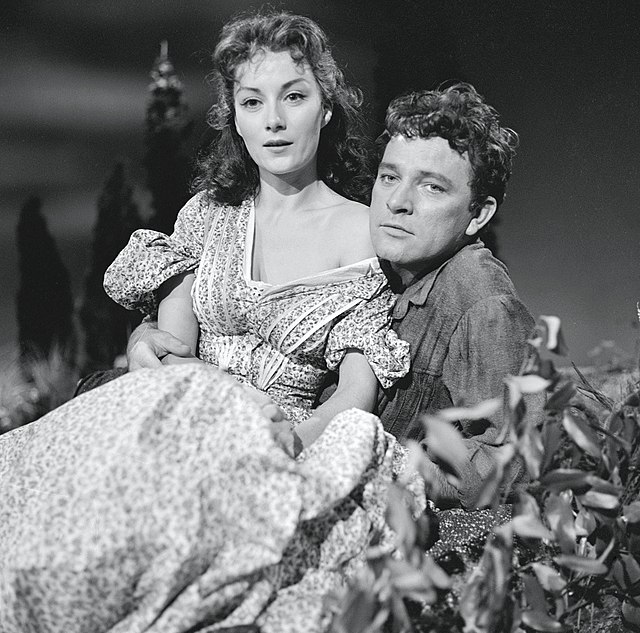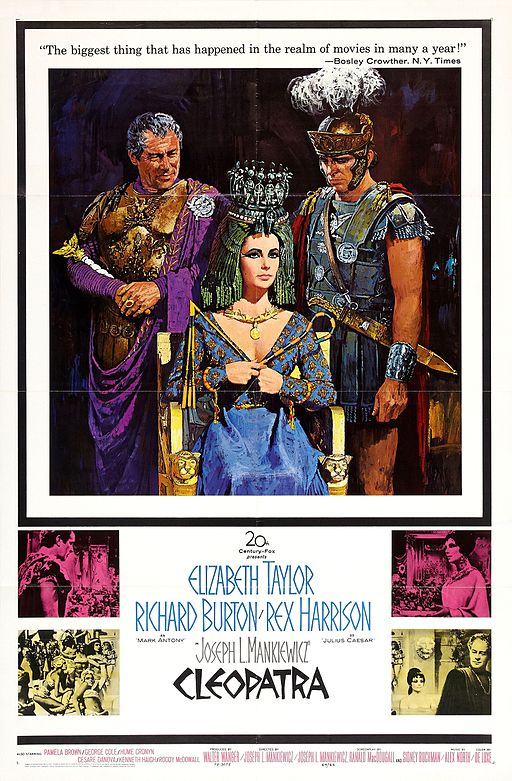Richard Burton
back| Full Name | Richard Walter Jenkins Jr. |
| Stage Name | Richard Burton |
| Born | November 10, 1925 |
| Birthplace | Pontrhydyfen, Glamorgan, Wales |
| Died | August 5, 1984 |
| Buried | Protestant Cemetery, Céligny, Switzerland |
| Married to | Sybil Williams (1949-1963) - Elizabeth Taylor (1964-1974, 1975-1976) - Susan Hunt (1976-1982) - Sally Hay (1983-1984) |
| Children | Katen Burton (with Sybil Williams) - Jessica Burton (with Sybil Williams) - Maria Burton (adopted daughter with Elizabeth Taylor) |
| Notable films | Who's Afraid of Virginia Woolf? (1966) - Cleopatra (1963) - Becket (1964) - The Night of the Iguana (1964) - The Spy Who Came in from the Cold (1965) - |
Richard Burton
The Welsh Lion
Richard Burton emerged as a leading actor known for his powerful voice and commanding presence. Raised in a mining village, he was mentored by school teacher Philip Burton, whose surname he adopted.
Burton's breakthrough came with "My Cousin Rachel" (1952) and "The Robe" (1953). He became an international star with "Cleopatra" (1963), where he began a tumultuous relationship with Elizabeth Taylor, leading to two high-profile marriages.
He died on August 5, 1984, leaving a legacy as one of the greatest actors of his generation.
Related
Richard Burton (1925 – 1984)
Biography and Career Overview
Richard Walter Jenkins Jr., known professionally as Richard Burton, was born on November 10, 1925, in the Welsh village of Pontrhydyfen, Glamorgan. He was the twelfth of thirteen children born to Richard Walter Jenkins Sr. and Edith Maude Jenkins. His mother died when he was just two years old, and he was subsequently raised by his elder sister Cecilia and her husband.
Burton displayed an early talent for performing and a remarkable memory for poetry, which was recognized by his school teacher Philip Burton. Philip took Richard under his wing, becoming his mentor and eventually his legal guardian, allowing Richard to assume his surname and to refine his acting skills.
Burton attended Port Talbot Secondary School and later Exeter College, Oxford, on a scholarship program for the RAF cadet during World War II. He left Oxford early to pursue acting and joined the Royal Air Force in 1944, serving as a navigator.
His professional stage debut came in 1944, and by 1949, he had made his film debut in "The Last Days of Dolwyn." His powerful presence and voice quickly made him a standout actor on stage and screen.
Burton's breakthrough came with the film "My Cousin Rachel" (1952), for which he received a BAFTA nomination and a New Star of the Year award. His role in "The Robe" (1953), the first film released in CinemaScope, made him a Hollywood star. His commanding performances and distinctive voice won him acclaim and established him as a leading actor of his generation.
In the 1960s, Burton's fame soared with performances in critically acclaimed films such as "Cleopatra" (1963), where he met Elizabeth Taylor. Their tumultuous relationship and subsequent marriages were highly publicized. Together, they starred in several films, most notably "Who's Afraid of Virginia Woolf?" (1966), which showcased Burton's remarkable talent and earned him one of his seven Academy Award nominations.
Burton was known for his versatility, excelling in both classical and contemporary roles. His portrayal of King Henry II in "Becket" (1964) and Thomas Becket was particularly praised, as was his role in "The Spy Who Came in from the Cold" (1965).
Personal Life:
Richard Burton's personal life was as dramatic as his career. He married Sybil Williams in 1949, and they had two daughters before divorcing in 1963. His relationship with Elizabeth Taylor began on the set of "Cleopatra," and their first marriage lasted from 1964 to 1974. They remarried in 1975 but divorced again in 1976. Burton then married Susan Hunt (1976-1982) and Sally Hay (1983 until his death).
Burton struggled with alcoholism, which affected both his health and career. Despite his personal challenges, he continued to work in film, theater, and television.
In his later years, Burton took on roles that continued to demonstrate his depth and range as an actor. One of his last significant performances was in the film adaptation of George Orwell's "1984."
Richard Burton died on August 5, 1984, from a cerebral hemorrhage in Céligny, Switzerland, where he was later buried in the Protestant Cemetery. His legacy as one of the greatest actors of the 20th century endures, marked by his powerful performances and his indelible impact on both stage and screen.
Michael Parkinson Interview with Richard Burton:
Acting Style of Richard Burton:
Vocal Power and Control
One of the most defining features of Richard Burton's acting style was his remarkable voice. Deep, resonant, and capable of conveying a wide range of emotions, Burton's voice could dominate a scene with its sheer power and gravitas. He had an extraordinary ability to modulate his tone, allowing him to deliver lines with an intensity that could be both commanding and nuanced. This vocal prowess made him particularly suited for stage performances and roles requiring authoritative or eloquent characters.
Emotional Intensity
Burton's performances were often characterized by a profound emotional intensity. He had a unique capacity to delve deeply into the psychological aspects of his characters, bringing forth a raw and authentic portrayal of their inner turmoil and conflicts. Whether playing a troubled alcoholic in "Who's Afraid of Virginia Woolf?" or the tormented King Henry II in "Becket," Burton conveyed a depth of feeling that left a lasting impact on audiences. His eyes, often described as piercing, added to this intensity, conveying complex emotions with just a glance.
Classical Training and Versatility
Burton's classical training, particularly his work with Shakespearean roles, influenced his acting style significantly. He brought a sense of discipline and precision to his performances, mastering the rhythm and flow of dialogue, especially in period pieces and literary adaptations. This training allowed him to transition seamlessly between the stage and screen, and between different genres, from historical dramas to contemporary psychological thrillers. His versatility was evident in his ability to portray a wide range of characters, from heroic figures to deeply flawed individuals.
Physical Presence
Burton's physical presence was another key element of his acting style. Tall and broad-shouldered, he had a commanding on-screen and on-stage presence that made him a natural fit for leading roles. He used his body language effectively to enhance his performances, whether through the authoritative stance of a military leader or the weary slump of a man burdened by personal demons. His movements were deliberate and purposeful, contributing to the overall impact of his character portrayals.
Charismatic and Complex Characters
Burton had a knack for portraying charismatic and complex characters. He often played roles that were morally ambiguous, deeply conflicted, or burdened by existential dilemmas. His ability to bring out the multi-faceted nature of these characters made his performances compelling and thought-provoking. Even when playing unsympathetic roles, Burton imbued his characters with a humanity that allowed audiences to empathize with their struggles.
Influence of Personal Life
Burton's tumultuous personal life, marked by his high-profile marriages, struggles with alcoholism, and intense relationships, often bled into his performances. There was a sense of lived experience and authenticity in his portrayals of characters grappling with similar issues. This personal connection added an extra layer of depth and realism to his acting, making his performances resonate on a deeper level.
Movie Chemistry between Richard Burton and Elizabeth Taylor:
The on-screen chemistry between Richard Burton and Elizabeth Taylor was electrifying and remains one of the most celebrated partnerships in cinematic history. Their intense personal relationship off-screen undoubtedly fueled their performances, making their on-screen interactions rich with genuine emotion and palpable tension.
Key Points About Their Chemistry:
- Natural Intensity:
The chemistry between Burton and Taylor was marked by a natural intensity. Their real-life romance, filled with passion and turbulence, translated seamlessly into their acting, providing an authentic connection that audiences could feel.
- Dynamic Range:
Both actors were capable of expressing a wide range of emotions, from deep love and tenderness to explosive anger and jealousy. This dynamic range made their scenes together compelling and unpredictable.
- Mutual Respect and Admiration:
Despite their tumultuous relationship, Burton and Taylor had immense respect and admiration for each other's talent. This professional respect allowed them to bring out the best in each other, creating powerful performances.
- Authentic Interactions:
Their real-life experiences and emotions often mirrored the roles they played, adding layers of authenticity to their interactions. This was especially evident in films like "Who's Afraid of Virginia Woolf?" where their characters' volatile relationship echoed their own.
Notable Films with Elizabeth Taylor:
- "Cleopatra" (1963):
The film where their romance began, "Cleopatra" showcased their undeniable chemistry as they played the iconic historical figures Cleopatra and Mark Antony. Their attraction was immediate and intense, both on and off the screen.
- "The V.I.P.s" (1963):
This film allowed them to explore the complexities of a strained marriage, bringing depth to their portrayals and highlighting their ability to convey both love and conflict.
- "The Sandpiper" (1965):
In "The Sandpiper," Burton and Taylor played lovers entangled in an extramarital affair. Their chemistry added a layer of authenticity to the film's exploration of passion and moral dilemmas.
- "Who's Afraid of Virginia Woolf?" (1966):
Perhaps their most acclaimed collaboration, this film saw them portraying a bitter, disillusioned couple. Their real-life relationship's raw emotions were channeled into their performances, resulting in a brutally honest and powerful depiction of marital strife.
Legacy of Their Partnership:
- Cultural Impact:
Burton and Taylor's partnership captivated audiences worldwide, making them one of Hollywood's most famous and talked-about couples. Their chemistry set a standard for romantic and dramatic partnerships in film.
- Enduring Appeal:
The authenticity and intensity of their on-screen chemistry have ensured that their films continue to be appreciated by new generations of viewers. Their performances remain benchmarks for acting excellence and emotional depth.
- Personal Connection:
The personal connection between Burton and Taylor added a unique layer to their performances. Their ability to convey deep, complex emotions made their characters more relatable and their stories more compelling.
Memorable Quotes from Richard Burton:
On acting and his career:
- "The essence of the motion picture actor's art is to be able to respond properly to imaginary circumstances."
- "An actor is something less than a man, while an actress is something more than a woman."
- "I am as thrilled by a good sentence in a good writer's book as I am by a good scene in a good actor's play."
On life and experiences:
- "I don't do anything, not one single thing. I used to feel as though I had to be somewhere, now I feel as though I never have to be anywhere ever again."
- "You may be as vicious about me as you please. You will only do me justice."
On his tumultuous relationship with Elizabeth Taylor:
- "You can't keep clapping a couple of sticks together without eventually producing a spark."
- "I might run from her for a thousand years and she is still my baby child. Our love is so furious that we burn each other out."
On fame and success:
- "I rather like my reputation, actually. The hedonist, the hellraiser — it is a part of me, it is not all of me, but it is a part of me."
- "If you're going to make rubbish, be the best rubbish in it."
On his Welsh heritage:
- "Home is where the heart is, and my heart is wherever I am at the moment."
On his struggles with alcohol:
- "I'm not a saint and I don't pretend to be. Alcohol has played a major part in my life."
On literature and writing:
- "I often quote myself. It adds spice to my conversation."
- "The more I read, the more I find life in books."
What Others Said about Richard Burton:
Fellow Actors and Directors:
Elizabeth Taylor (Actress and his wife):
- "Richard is a very sexy man. He's got that sort of jungle essence that one can sense."
- "He was the kindest, funniest, and most gentle father. All my kids adored him."
Peter O'Toole (Actor):
- "He was a magnificent actor, possessed of an extraordinarily beautiful voice and a wicked sense of humor."
John Gielgud (Actor):
- "Burton is rather like a great lorry, which is pulling the whole Shakespearean stage behind it."
Robert Hardy (Actor):
- "Richard was, quite simply, the best. He had a magical voice and a wonderful presence."
Critics and Biographers:
Kenneth Tynan (Theater Critic):
- "He is the natural successor to Olivier, and his voice is the most perfect instrument of its kind that has ever been trained in an English-speaking theatre."
Melvyn Bragg (Author and Biographer):
- "He brought a kind of fierce energy to his performances that was both exhilarating and terrifying."
Colleagues and Friends:
Tony Richardson (Director):
- "Richard had that rare combination of beauty, intelligence, and sheer acting talent. He was capable of extraordinary depth and subtlety."
Michael Caine (Actor):
- "He was one of the greatest actors of all time. He was one of those rare actors who had a natural presence on stage and screen."
Journalists and Observers:
John Osborne (Playwright):
- "He was a man with enormous talent and charm. His performances were always electric."
David Frost (Journalist and Broadcaster):
- "Richard Burton was a star in every sense of the word. He had a magnetism that drew people to him both on and off the screen."
Personal Reflections:
Richard Harris (Actor):
- "Burton had an innate sense of the tragic. His performances were often infused with a deep sense of melancholy and existential angst."
Sally Hay (His fourth wife):
- "Richard was a complex man, capable of great warmth and generosity. His charm was irresistible, and his talent was immense."
Legacy:
Steven Berkoff (Actor and Director):
- "Burton's legacy is that of a true giant of the theatre and film. His voice and presence remain unparalleled."
Sir Laurence Olivier (Actor):
- "Richard Burton was one of the finest actors of our time. His contribution to the world of theatre and film is invaluable."
Awards and Recognition:
Academy Awards (Oscars)
Nominations:
- 1952: Best Supporting Actor for "My Cousin Rachel"
- 1953: Best Actor for "The Robe"
- 1964: Best Actor for "Becket"
- 1965: Best Actor for "The Spy Who Came in from the Cold"
- 1966: Best Actor for "Who's Afraid of Virginia Woolf?"
- 1969: Best Actor for "Anne of the Thousand Days"
- 1977: Best Actor for "Equus"
Golden Globe Awards
Wins:
- 1953: Best Actor – Motion Picture Drama for "The Robe"
- 1977: Best Actor – Motion Picture Drama for "Equus"
Nominations:
- 1964: Best Actor – Motion Picture Drama for "Becket"
- 1965: Best Actor – Motion Picture Drama for "The Night of the Iguana"
- 1966: Best Actor – Motion Picture Drama for "The Spy Who Came in from the Cold"
- 1969: Best Actor – Motion Picture Drama for "Anne of the Thousand Days"
- 1984: Best Actor – Miniseries or Television Film for "Wagner"
British Academy of Film and Television Arts (BAFTA) Awards
Wins:
- 1966: Best British Actor for "The Spy Who Came in from the Cold"
Nominations:
- 1952: Best Newcomer for "My Cousin Rachel"
- 1954: Best British Actor for "The Desert Rats"
- 1960: Best British Actor for "Look Back in Anger"
- 1966: Best British Actor for "The Spy Who Came in from the Cold"
- 1978: Best Actor for "Equus"
Tony Awards
Wins:
- 1951: Best Featured Actor in a Play for "The Young Elizabeth"
- 1961: Best Actor in a Play for "Camelot"
- 1976: Special Tony Award for his contributions to the theatre
Nominations:
- 1961: Best Actor in a Play for "Camelot"
- 1964: Best Actor in a Play for "Hamlet"
Primetime Emmy Awards
Wins:
- 1967: Outstanding Single Performance by an Actor in a Leading Role in a Drama for "The Spy Who Came in from the Cold"
Nominations:
- 1980: Outstanding Lead Actor in a Limited Series or a Special for "Wagner"
Other Awards
David di Donatello Awards:
- 1967: Best Foreign Actor for "The Taming of the Shrew"
Laurence Olivier Awards:
- 1979: Best Actor for "Camelot"
National Board of Review:
- 1966: Best Actor for "Who's Afraid of Virginia Woolf?"
New York Film Critics Circle Awards:
- 1966: Best Actor for "Who's Afraid of Virginia Woolf?"
Honorary Awards
Special Tony Award: 1976, for his contributions to the theatre.
Festival Awards
Cannes Film Festival:
- 1953: Best Actor for "The Robe" (won)
Venice Film Festival:
- 1978: Best Actor for "Equus" (won)
Movies featuring Richard Burton:
1949
"The Last Days of Dolwyn": A drama set in a Welsh village threatened by flooding, where a con man schemes to buy up the villagers' properties.
1950
"Waterfront": A British crime drama about a sailor's troubled return to his family after World War II.
1952
"My Cousin Rachel": A gothic romance where a young man suspects his cousin's widow of murdering him, only to fall in love with her.
1953
- "The Desert Rats": A war film depicting the battle for Tobruk during World War II, focusing on the relationship between a British officer and his troops.
- "The Robe": A biblical epic about a Roman tribune who is converted to Christianity after overseeing Christ's crucifixion.
1954
- "The Rains of Ranchipur": A romantic drama about a British couple's troubled marriage set against the backdrop of an Indian monsoon.
- "Prince of Players": A biographical film about the famous 19th-century American actor Edwin Booth.
1955
"The Sea Hawk": A seafaring adventure where a former captain joins the British navy to fight against the Spanish Armada.
1956
- "Alexander the Great": An epic historical drama depicting the life and conquests of the legendary Macedonian ruler.
- "Sea Wife": A drama about a shipwreck survivor's quest to find a mysterious woman he encountered during the disaster.
1957
"Bitter Victory": A war film about the psychological conflict between two officers on a mission during World War II.
1958
"Look Back in Anger": A drama centered on a disillusioned young man who lashes out at those around him.
1959
"The Bramble Bush": A medical drama where a doctor must confront his moral dilemmas and romantic entanglements.
1960
"Ice Palace": A drama about the struggles of two friends in the Alaskan fishing industry.
1962
- "The Longest Day": A war film recounting the D-Day invasion of Normandy from various perspectives.
- "The V.I.P.s": A drama about the intertwined lives of passengers stranded at an airport.
1963
"Cleopatra": A historical epic chronicling the life of the Egyptian queen and her relationships with Julius Caesar and Mark Antony.
1964
- "Becket": A historical drama about the friendship and conflict between King Henry II and Thomas Becket, the Archbishop of Canterbury.
- "The Night of the Iguana": A drama about a defrocked clergyman who encounters personal demons while working as a tour guide in Mexico.
- "The Sandpiper": A romantic drama about an unconventional artist and her affair with a married school principal.
1965
"The Spy Who Came in from the Cold": A Cold War thriller about a British intelligence officer sent on a mission to East Germany.
1966
- "The Taming of the Shrew": A comedic adaptation of Shakespeare's play about the fiery relationship between Petruchio and Katherina.
- "Who's Afraid of Virginia Woolf?": A drama about a bitter, aging couple who invite a younger couple over for a night of psychological games and verbal warfare.
1967
"The Comedians": A political drama about the complex lives of expatriates in Haiti during the Duvalier regime.
1968
"Doctor Faustus": A dramatic adaptation of Marlowe's play about a man who sells his soul to the devil for knowledge and power.
1969
- "Where Eagles Dare": A war film about a daring mission to rescue an American general from a Nazi fortress.
- "Anne of the Thousand Days": A historical drama about the tumultuous marriage between King Henry VIII and Anne Boleyn.
1970
- "Staircase": A comedy-drama about an aging gay couple grappling with their relationship and societal pressures.
- "Villain": A crime drama about a ruthless gang leader who plans a daring heist.
1971
- "Raid on Rommel": A war film about a British officer's plan to attack Rommel's supply lines in North Africa.
- "Zeppelin": A war adventure about a German-born British officer who infiltrates a German zeppelin to sabotage a secret mission.
1972
- "Under Milk Wood": A film adaptation of Dylan Thomas's play about the dreams and realities of the inhabitants of a Welsh fishing village.
- "Hammersmith Is Out": A comedy-drama about an ambitious mental hospital orderly who teams up with a manipulative inmate.
1973
"Massacre in Rome": A war drama based on the true story of Nazi retaliation against Italian resistance fighters.
1974
- "The Klansman": A drama about racial tensions and violence in a small Southern town.
- "Brief Encounter": A remake of the classic romance about two strangers who meet and fall in love, despite both being married.
1977
"Equus": A psychological drama about a psychiatrist who treats a young man with a pathological religious fascination with horses.
1978
"The Medusa Touch": A thriller about a novelist who believes he has the power to cause disasters with his mind.
1979
"Circle of Two": A romantic drama about the relationship between a teenage girl and an older artist.
1980
"Breaker Morant": A war film about three Australian soldiers court-martialed for executing prisoners during the Second Boer War.
1981
- "Wagner": A biographical miniseries about the life of the composer Richard Wagner.
- "Lovespell": A romantic drama about the love triangle involving Tristan, Isolde, and King Mark of Cornwall.
1983
"The Wild Geese II": An action film about a mercenary mission to rescue Rudolf Hess from Spandau Prison.
1984
"1984": A dystopian drama based on George Orwell's novel, depicting a totalitarian society under constant surveillance.

